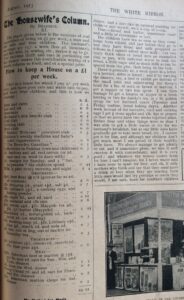We are certainly going through some challenging times at the moment, with many of us feeling stressed and anxious due to the Covid-19 pandemic and all the worries that brings into our lives on a daily basis. With the vaccine now being rolled out and Spring on the way we can all start to look forward to some brighter days ahead but the challenges have come in all shapes and forms along the way. Sometimes when we look to the past it can provide us some much needed perspective and also the encouragement that we can face these difficulties and come through the other side often stronger than we were before, and with a new found appreciation for all we have in our lives.
This certainly happened to me when I was flicking through the pages of a 1913 copy of the White Ribbon magazine. We hold original copies of this publication that were published on a monthly basis by the National British Women’s Temperance Association (forerunner of the White Ribbon Association), as a means of sharing news with women members across the country. Along with temperance news, these magazines also included other items of interest and the article that caught my eye was in The Housewife’s Column of August 1913 – ‘How to Keep House on a £1 per week’.
I will admit that during the first lockdown when loo rolls disappeared off the shelves at an alarming rate, along with pasta, tinned tomatoes and baked beans, I actually remember having a moment when I panicked that I wouldn’t be able to get the specific brand of baked beans that we liked! How would we cope as a family?! There would be an outcry around the dinner table if we had to eat own brand beans or even the horrifying thought that we couldn’t get baked beans ever again!! My catastrophic thinking about baked beans did calm down I am pleased to report and reading the article from 1913 certainly gave me a much needed reality check.
The housewife of the 1913 article explains how she manages her weekly budget for a household of six, including 4 children, on a weekly budget of £1. This is equivalent to approximately £116 per week in today’s money. This was not just her grocery bill for six people per week, this was her total household outgoings including rent, rates, insurance, gas, oil and clothing. We obviously have to take into consideration other cost of living comparisons between then and now, but it is certainly an eye opener. She is clearly proud (and rightly so), about how well she looks after her family on the income that she and her husband earn and how she ekes out her weekly groceries. Her standard food items were basic without the vast choice that we enjoy today, yet she provided a regular menu of meat, fish, vegetables and even puddings.
Included on her list of weekly groceries were –
- Milk
- Flour
- Currants
- Sugar
- Oatmeal
- Fish, Cod or Ling
- Potatoes
- Carrots
- Blue Peas
- Beef or Mutton
- Sheep’s Head
- Suet
- Liver
She saved money in the winter months by lighting paraffin lamps rather than the gas until the children went to bed at eight and then she could sew by gas light at night. Breakfast was oatmeal ‘well creed’ in water (until all the water is absorbed), cooled with milk, bread and butter or toast, and tea or cocoa for the children.
Example dinners were –
Sunday – Roast meat, Yorkshire Pudding, mashed potatoes and peas
Monday – Cold meat and rice pudding to follow
Tuesday – Stew or Hash using remains of meat, onion, carrots, potatoes and currant pudding to follow
Wednesday – Liver and savoury dumplings, rice pudding to follow
Thursday – Sheep’s head, carrots, peas, onions with suet dumplings
Friday – Remains of Thursdays dinner with roly-poly or apple pudding
Saturday – American mutton chops for husband’s dinner, rice or oatmeal pudding for wife and children
She writes that the children have tea as soon as they come home from school and just before they go to bed they have bread and milk. Sometimes the dinners were varied by substituting rabbit and if any ‘coppers’ were spared a bloater, kipper or herring could be bought for her husband’s tea. She tried her best to swap around her groceries within her budget so that no two weeks were alike and says that although her children didn’t get much meat she is ‘proud of their healthy little faces’. She admits that it is ‘sometimes plain’ but they ‘mix it and sweeten it with contentment, and it is very good’.
I think that contentment here is a key word. She believed that she was doing a good job looking after her family and she wanted to share that. I am sure that she was experiencing her own stresses and anxieties but she certainly wasn’t worrying if she could buy a certain brand of baked bean! World War 1 was just around the corner and following that the Spanish Flu Pandemic of 1918. My own Grandmother was born in 1900, living through the 1918 pandemic and both wars to a grand old age of 99. I often remember how calm and contented she appeared, never really complaining about much at all. Maybe she had learnt through these experiences what were the truly important things in life.
I’ve definitely decided that worrying about baked beans won’t be keeping me awake at night anymore……but did I buy enough loo rolls?!
Advice on Mental Health issues can be found at the following websites –
https://www.nhs.uk/oneyou/every-mind-matters

